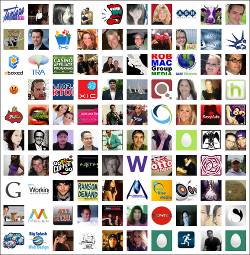
I don’t write a lot about Twitter these days. I did back in the golden days, but many Twitter users don’t readily recall “The Golden Days of Twitter”. Today, I want to offer up some recent observations about Twitter, along with some rather curious numbers.
If you are an old timer with Twitter, you will almost undoubtedly nod and agree with a lot of this. If you are new with Twitter, this should help you understand the service in ways you may have missed. If you are one of those incessant spammers of modern day Twitter, oh yes … then you must be new, or you would have received the memo to explain how the Twitter Follower Frenzy just makes you look bad.
I want to offer a short bit about Twitter following, but then show you more about where Twitter is going for those people who are unwilling to adapt to a better, and smarter purpose for their tweeterizing. Oh, don’t get me wrong, I’m not here to tell you the right or wrong way to use your Twitter … I will just give you some facts and figures and let you see for yourself.
Holy Bird Poop! Look at These Twitter Followers!
Once in a while, but less frequently than before, I check to see who is following me on Twitter. There are always a few new faces to greet me, and I like to know who they are, the best I can.
I used to try and follow most people who followed me on Twitter, so they could feel free to reach out to me directly with a private direct message if they should choose. It has never been because I was concerned they would stop following me if I did not return the “favor”, as if it is some amazing favor to follow somebody. Maybe they think it’ll make them famous … or at least feel famous.
This is just a bit of opinion, but it seems to me that following somebody’s Twitter feed should be because you are interested in what they share, or because you are interested in establishing some sort of communication with them. Am I right, or did I miss something?
Let me show you what I found yesterday when I looked through the list of people who, in theory, wanted to know what I have to say on Twitter. This table includes numbers I gathered from the most recent 100 people who followed my Twitter feed. I chose to follow a few of them, but I want you to take a quick glance through the list. Below the list, I will share some averages, and logical assumptions that a reasonable person could make.
| followers | following | ratio | more or less | tweets |
| 1097 | 1931 | 1.76 : 1 | 834 | 814 |
| 1015 | 1989 | 1.96 : 1 | 974 | 889 |
| 2977 | 2359 | 0.79 : 1 | -618 | 815 |
| 66 | 311 | 4.71 : 1 | 245 | 917 |
| 202 | 1928 | 9.54 : 1 | 1726 | 30 |
| 579 | 2001 | 3.46 : 1 | 1422 | 1037 |
| 233 | 868 | 3.73 : 1 | 635 | 952 |
| 2099 | 2300 | 1.10 : 1 | 201 | 793 |
| 617 | 1170 | 1.90 : 1 | 553 | 91 |
| 6323 | 6459 | 1.02 : 1 | 136 | 1557 |
| 113 | 308 | 2.73 : 1 | 195 | 614 |
| 365 | 1002 | 2.75 : 1 | 637 | 456 |
| 12471 | 12861 | 1.03 : 1 | 390 | 18712 |
| 6265 | 6103 | 0.97 : 1 | -162 | 4229 |
| 524 | 2001 | 3.82 : 1 | 1477 | 86 |
| 403 | 678 | 1.68 : 1 | 275 | 295 |
| 2362 | 2416 | 1.02 : 1 | 54 | 6160 |
| 9481 | 10427 | 1.10 : 1 | 946 | 9115 |
| 1938 | 1999 | 1.03 : 1 | 61 | 3486 |
| 1178 | 1956 | 1.66 : 1 | 778 | 1341 |
| 8439 | 8238 | 0.98 : 1 | -201 | 144 |
| 1662 | 1956 | 1.18 : 1 | 294 | 325 |
| 1888 | 1902 | 1.01 : 1 | 14 | 714 |
| 112 | 138 | 1.23 : 1 | 26 | 504 |
| 2094 | 2305 | 1.10 : 1 | 211 | 451 |
| 729 | 1248 | 1.71 : 1 | 519 | 2588 |
| 5166 | 5597 | 1.08 : 1 | 431 | 7871 |
| 287 | 1685 | 5.87 : 1 | 1398 | 94 |
| 484 | 910 | 1.88 : 1 | 426 | 1069 |
| 334 | 745 | 2.23 : 1 | 411 | 7025 |
| 1123 | 1961 | 1.75 : 1 | 838 | 1448 |
| 285 | 351 | 1.23 : 1 | 66 | 4350 |
| 73 | 482 | 6.60 : 1 | 409 | 27 |
| 205 | 246 | 1.20 : 1 | 41 | 473 |
| 10859 | 11887 | 1.09 : 1 | 1028 | 1076 |
| 157 | 575 | 3.66 : 1 | 418 | 155 |
| 90 | 1229 | 13.66 : 1 | 1139 | 6 |
| 646 | 1252 | 1.94 : 1 | 606 | 1313 |
| 194 | 284 | 1.46 : 1 | 90 | 173 |
| 4169 | 3298 | 0.79 : 1 | -871 | 4047 |
| 9107 | 9299 | 1.02 : 1 | 192 | 764 |
| 13779 | 10807 | 0.78 : 1 | -2972 | 1650 |
| 990 | 1943 | 1.96 : 1 | 953 | 3135 |
| 174 | 393 | 2.26 : 1 | 219 | 115 |
| 175 | 376 | 2.15 : 1 | 201 | 58 |
| 35 | 242 | 6.91 : 1 | 207 | 22 |
| 431 | 905 | 2.10 : 1 | 474 | 10 |
| 1015 | 1113 | 1.10 : 1 | 98 | 1540 |
| 1691 | 1693 | 1.00 : 1 | 2 | 1237 |
| 1373 | 1979 | 1.44 : 1 | 606 | 527 |
| 272 | 571 | 2.10 : 1 | 299 | 457 |
| 438 | 1085 | 2.48 : 1 | 647 | 425 |
| 661 | 219 | 0.33 : 1 | -442 | 154 |
| 1877 | 2055 | 1.09 : 1 | 178 | 3044 |
| 2204 | 2394 | 1.09 : 1 | 190 | 3359 |
| 2249 | 2393 | 1.06 : 1 | 144 | 350 |
| 168 | 796 | 4.74 : 1 | 628 | 6 |
| 60 | 922 | 15.37 : 1 | 862 | 54 |
| 301 | 717 | 2.38 : 1 | 416 | 124 |
| 401 | 2000 | 4.99 : 1 | 1599 | 76 |
| 48 | 405 | 8.44 : 1 | 357 | 10 |
| 3312 | 3635 | 1.10 : 1 | 323 | 2171 |
| 23141 | 20522 | 0.89 : 1 | -2619 | 3126 |
| 329 | 720 | 2.19 : 1 | 391 | 13 |
| 12 | 41 | 3.42 : 1 | 29 | 27 |
| 2716 | 2964 | 1.09 : 1 | 248 | 1314 |
| 1066 | 2001 | 1.88 : 1 | 935 | 1405 |
| 242 | 601 | 2.48 : 1 | 359 | 53 |
| 272 | 373 | 1.37 : 1 | 101 | 10 |
| 806 | 1873 | 2.32 : 1 | 1067 | 447 |
| 1005 | 1628 | 1.62 : 1 | 623 | 67 |
| 1316 | 1442 | 1.10 : 1 | 126 | 48 |
| 134 | 653 | 4.87 : 1 | 519 | 152 |
| 293 | 1389 | 4.74 : 1 | 1096 | 76 |
| 149 | 2001 | 13.43 : 1 | 1852 | 11 |
| 138 | 638 | 4.62 : 1 | 500 | 17 |
| 4387 | 4788 | 1.09 : 1 | 401 | 55 |
| 4329 | 3688 | 0.85 : 1 | -641 | 180 |
| 89 | 491 | 5.52 : 1 | 402 | 5 |
| 1121 | 1866 | 1.66 : 1 | 745 | 662 |
| 132 | 1030 | 7.80 : 1 | 898 | 20 |
| 135 | 226 | 1.67 : 1 | 91 | 66 |
| 2317 | 2551 | 1.10 : 1 | 234 | 618 |
| 380 | 1143 | 3.01 : 1 | 763 | 55 |
| 70082 | 73497 | 1.05 : 1 | 3415 | 1815 |
| 24118 | 21839 | 0.91 : 1 | -2279 | 700 |
| 972 | 1384 | 1.42 : 1 | 412 | 522 |
| 140 | 146 | 1.04 : 1 | 6 | 472 |
| 877 | 1034 | 1.18 : 1 | 157 | 312 |
| 5337 | 5239 | 0.98 : 1 | -98 | 410 |
| 65 | 257 | 3.95 : 1 | 192 | 108 |
| 3472 | 3779 | 1.09 : 1 | 307 | 1190 |
| 459 | 1025 | 2.23 : 1 | 566 | 73 |
| 572 | 1129 | 1.97 : 1 | 557 | 35 |
| 301 | 1097 | 3.64 : 1 | 796 | 489 |
| 548 | 2001 | 3.65 : 1 | 1453 | 2 |
| 116 | 1267 | 10.92 : 1 | 1151 | 1 |
| 194 | 1518 | 7.82 : 1 | 1324 | 121 |
| 130 | 177 | 1.36 : 1 | 47 | 15 |
| 61 | 400 | 6.56 : 1 | 339 | 1 |
| avg. followers | avg. following | avg. ratio | avg. difference | avg. tweets |
| 2820.18 | 3217.16 | 2.84 : 1 | 396.98 | 1202.23 |
| total followers | total following | total tweets | ||
| 282,018 | 321,716 | 120,223 |
What Do These Twitter Follower Numbers Indicate?
What I hope you will notice is that the average of these 100 users is following 2.84 other users to every one who follows them. That came out to the average person following 396.98 more people than are following them. A common strategy Twitter has tried to address is that of following a lot of people in hopes they will return the follow. Twitter has set limits as an effort to avoid this, but it is still alive and going strong. What so many people don’t understand is how worthless it truly is in practice.
Now, we could assume the 284 percent (2.84:1 ratio) means people are just doing a lot of “listening” to others, but I found reasons to doubt that. I have tested simply re-following everybody who follows me on Twitter, and you probably guessed it … my follower count goes up like mad! When I stop re-following everybody, it levels off.
This whole topic is much like I wrote about two years ago in an article titled “Follow, Unfollow, Re-Follow … What?!” In that article, I even offered a logical alternative, but apparently that memo missed a few desks.
Perhaps an even more important read for people doing this would be a popular piece I wrote titled “Social Media and The Absurdity of Implied Reciprocity“. Yes, I said “absurdity”, and based on public reception of that article, I think I built a pretty darn good case against this tactic.
What is Twitter Really Getting You?
I’m going to show you some real numbers that reflect user attention and engagement. Of course, there is much more to Twitter than just sharing website links, but since it is a valuable part of Twitter for many people, I’ll use website traffic to make the point.
Let’s look at some sobering numbers based on over 1,000 tweets, and their affect on website visits. Below is a table showing the ten most recent articles published here on my blog, along with the number of times they were tweeted at the time I wrote this. The total of tweets is 1016. The average number of tweets is 101.6, with the lowest at 48 and the highest at 228. Those are sufficient numbers for the point I want to illustrate.
In a perfect world, that will happen because they were just downright great information, but it also happens too often because enough people clicked and saw a startling number of retweets, and so they tweet it without reading beyond the first three lines.
Yes, in far too many cases, people will just assume it is good, because enough others thought it was good … neglecting that mind of their own altogether. Fortunately for you, you’re still reading, and you are judging for yourself.
| Most Recent Articles on SEO and Social Media Marketing Blog | Tweets |
| Persecution of Excellence: What Einstein Knew About Marketing | 86 |
| Search Engine Optimization is Not a Technology Job! | 119 |
| Why I’m Unsubscribing and Reading Fewer Blogs | 80 |
| “Everybody” is Not Your Target Market! | 166 |
| SEO and Social Media Fear of Being “The D Word” | 48 |
| Social Media Marketing is More Than Social Networking | 228 |
| Can You Value Each Blog Post at $10,000? | 70 |
| Paradigm Shifting, Initial Perceptions, and Marketing Communication | 58 |
| Strategic Marketing Failure: Are You Giving it Up Too Easy? | 59 |
| Is Social Media Like Space Exploration? | 102 |
| Average Number of Tweets | 101.6 |
| Total Number of Tweets | 1016 |
I measure everything. Measuring and analyzing data is an important part of my job. So I’ll tell you what I found from those 1016 tweets, and their multi-million user exposure. The readership totals reflected great signs that readers were paying attention. They spent an average time on page of more than five minutes. That includes the 10 second clicks, and it is good time on page. The average pages visited by readers referred through a link from Twitter was 1.8, so a decent number of them clicked around.
Here’s the punchline! Out of this sample of 1016 tweets by many different users, the highest number of website visits attributed to any individual tweet was 21. The average number of visits per tweet came to 2.74. Maybe that doesn’t seem very surprising, but let’s add some contrast. Two years ago, I witnessed no less than 500 visits from a single tweet within the first hour of tweeting a link to my blog. My guess is that the past level of engagement and traffic generation from Twitter had a big role in its eventual degradation. Times have changed, and much of that change can be attributed to the following frenzy I described.
I Still Like Twitter … But …
I like Twitter a lot, and I don’t intend to stop using it any day soon. Twitter presently accounts for approximately 10 percent of traffic to my blog. I’ll take that 10 percent, but one thing I’m certainly not going to do is worry about whether a squillion people follow me.
The way I see the math, even if each and every one of those 100 users I listed above were to read an article and then tweet the link to my blog, on a sunny day I could expect 374 website visits from that (their 100 visits, plus an average 2.74 visits per tweet times 100). Based on their usage model, I think that would be a pretty steep climb.
The overall average engagement of Twitter users is very low. There is a relatively minuscule few who truly make good use of the service, and those are the ones I enjoy my Twitter time with.
What do you observe about Twitter?
P.S.
I hand-picked some articles I have written about Twitter. I hope you will enjoy these.
- How To Become Popular on Twitter Without Actually Being Useful (humor)
- Did Twitter Go Deaf With Broadcast Static? (I saw this a long time ago)
- Twitter is Useful but Blogging is Better (interesting statistics)
- Twitter: The Tweet About Retweet (the old days of Twitter)
- Follow, Unfollow, Re-Follow … What?! (sensible thoughts on follower numbers)
- Twitter Like The Twitterati … But Get Me a Bucket! (humorous yet tragic)
- Dear Tweeps: I love you so much … (humor)
If you still insist on more, I wrote a book about Twitter.
Podcast: Play in new window | Download



